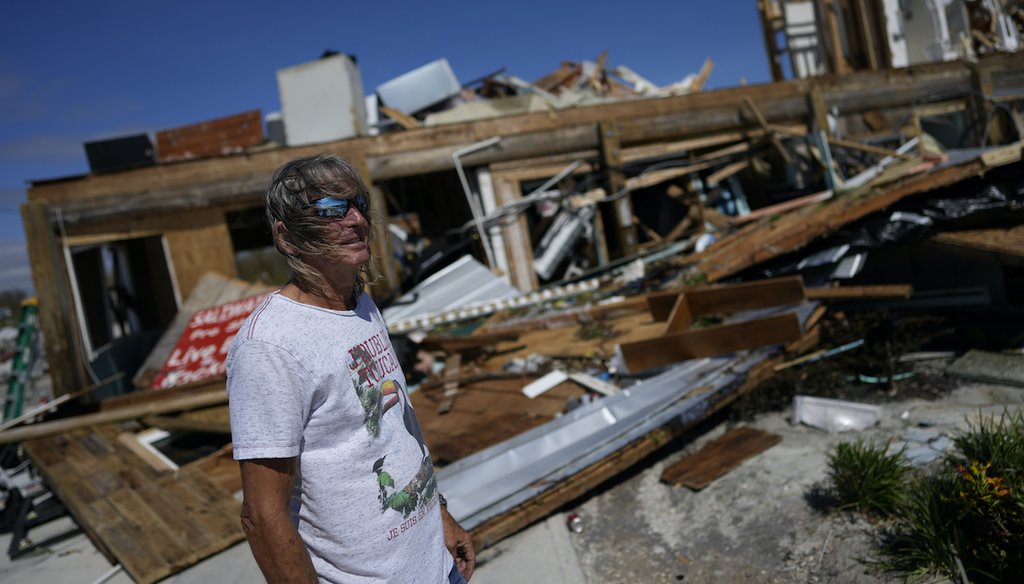Stand up for the facts!
Our only agenda is to publish the truth so you can be an informed participant in democracy.
We need your help.
I would like to contribute

Robert Leisure surveys his business, Getaway Marina, which was destroyed during the passage of Hurricane Ian, in Fort Myers Beach, Fla., Thursday, Sept. 29, 2022. (AP)
Did Rubio and DeSantis vote against Hurricane Sandy aid?
If Your Time is short
- Sen. Marco Rubio and Gov. Ron DeSantis have sought assistance from the Biden administration for disaster relief in Florida following Hurricane Ian.
- In 2012 and 2013, Rubio voted against the larger aid packages for victims of Hurricane Sandy but supported smaller aid bills. Hurricane Sandy made landfall Oct. 29, 2012, and devastated portions of the East Coast, including New York and New Jersey.
- In 2013, then-U.S. Rep. DeSantis voted against hurricane aid for Sandy’s victims.
When a hurricane strikes Florida, it provides a rare moment when Republican and Democratic politicians agree on policy: They all want federal money to help the state recover from devastation.
When Hurricane Ian hit Florida, U.S. Sen. Marco Rubio, a Republican, joined Florida’s full congressional delegation in signing a letter to President Joe Biden seeking a major disaster declaration, which allows for temporary aid. Gov. Ron DeSantis, also a Republican, sent Biden a similar letter.
The requests from the Republicans for help from a Democratic president and administration prompted many Twitter users to suggest that Rubio and DeSantis are hypocrites. They said the Republicans opposed federal relief for New York and New Jersey after Hurricane Sandy battered those states in 2012.
"Just a reminder to New York … Marco Rubio and Ron DeSantis (who was then in Congress) voted against aid for Hurricane Sandy. But because we are New York, we care about everyone," tweeted Yuh-Line Niou, a Democrat who represents areas of Manhattan in the New York Assembly. "Even when they don’t care about us."
Craig Fugate, a former director of the Federal Emergency Management Agency, said Hurricane Ian could be "one of the highest losses in hurricanes in recent U.S. history." One early estimate said property damage losses could be $40 billion.
The major disaster declaration Biden signed Sept. 29 unlocks the Disaster Relief Fund so FEMA can provide immediate aid, including temporary housing assistance. The declaration will result in billions of dollars flowing to Florida, said Steve Ellis, president of the government spending watchdog group Taxpayers for Common Sense. But if lawmakers want to provide more relief, they will need to pass supplemental appropriations.
When asked to back up Niou’s claim, her spokesperson pointed to articles about Rubio’s vote against Hurricane Sandy aid. We looked at multiple votes by the lawmakers and news analysis to get a more complete picture of their votes in 2012 and 2013.
Votes on Hurricane Sandy packages
Hurrianne Sandy made landfall Oct. 29, 2012, and devastated portions of the East Coast, including New York and New Jersey.
The path to passing a relief package was slower than after Hurricane Katrina hit Louisiana and Mississippi in 2005. Following Hurricane Sandy, President Barack Obama had just been elected to a second term and conservative Republicans elected in a tea party wave in 2010, and then in 2012, were looking for ways to curb spending.
On Dec. 7, Obama requested $60.4 billion in emergency appropriations. Three weeks later, the Democratic-led Senate voted 62-32 to approve it, with Rubio voting against. Twelve Republicans joined the Democrats in voting for the bill. Republicans then countered with a stripped-down alternative of $24 billion, which Rubio supported but which failed on a party-line vote.
Rubio said he voted against the larger bill because it contained "unrelated pork." ("Pork" or "pork barrel" spending is government spending for localized projects secured primarily or solely for bringing money to political representatives’ districts.)
There was funding for many things in the $60.4 billion package, including money for a declared fishery disaster in Alaska, Ellis said. But nearly everything had some relationship to a disaster — not only Sandy — although some were more tenuous than others.
"The question is did it have to be funded in an emergency supplemental" meaning it would allow lawmakers to evade budget caps, Ellis said. "And the question for Sen. Rubio and every other senator, is how much is too much extra stuff and what is the alternative."
Then-House Speaker John Boehner, R-Ohio, sought to divide the relief funding. FEMA warned that it would run out of money in January if Congress didn’t provide additional borrowing authority to pay claims. The first vote, a $9.7 billion measure, passed the House on Jan. 4.
DeSantis, a newly sworn-in congressman, was one of 67 House Republicans who voted against the bill. DeSantis said he sympathized with victims and that those with flood insurance should have their claims paid. But he said that "allowing the program to increase its debt by another $9.7 billion with no plan to offset the spending with cuts elsewhere is not fiscally responsible."
The funding passed the Senate in a voice vote, in which individual senators’ votes are not recorded. Rubio spokesman Alex Conant told the Tampa Bay Times that Rubio supported it, calling it a "clean" appropriation. Obama signed the measure into law.
The second part of the disaster relief, a bill for $50.5 billion, passed the Senate Jan. 28, 2013, 62-36 largely along party lines. Rubio voted against the bill and DeSantis voted against the measure that passed in the House. Obama signed it into law.
Republicans who objected made similar "pork" arguments. Sen. Ted Cruz, R-Texas, said two-thirds of the bill was pork spending unrelated to hurricane relief.
The data and the assessment of those who studied the Sandy bill say the extras in it amounted to far less than Cruz suggested. We rated the statement Mostly False.
Until Sandy, disaster spending prompted little acrimony, Ellis said. Sometimes, there were quibbles about continued appropriations for a period after a disaster, such as subsequent appropriations for Hurricane Katrina, but not much.
"This changed with Sandy because of two things: One, it affected primarily the ‘blue’ states of New Jersey, New York, and Connecticut, and two, it came right on the heels of fiscal conservative pushes."
DeSantis and some of the other Republicans who voted against Sandy relief later would form the Freedom Caucus, which often sought to block Democratic budget deals.
We contacted a DeSantis spokesperson to ask whether he had any evidence for us to consider about past storm relief spending. Spokesperson Bryan Griffin said "we are completely focused on hurricane response. As the governor said earlier, we have no time for politics or pettiness." Rubio’s spokespeople did not respond.
Our ruling
Niou said Rubio and DeSantis "voted against aid for Hurricane Sandy."
Niou is on firmer ground about DeSantis but omits that Rubio voted against the larger Sandy aid bill but did vote for less extensive bills.
Rubio voted against a $60.4 billion bill for Sandy relief in December 2012, but supported an alternative $24 billion measure that failed. In January 2013, Rubio supported a $9.7 billion aid bill, but not a $50 billion bill.
DeSantis voted against both $9.7 billion and $50 billion in Sandy relief in January 2013 as a newly elected congressman.
We rate this statement Mostly True.
Our Sources
New York Assembly Member Yuh-Line Niou, Tweet, Sept 28, 2022
White House, President Joseph R. Biden, Jr. Approves Florida Disaster Declaration, Sept. 29, 2022
Gov. DeSantis, Letter to President Biden, Sept. 28, 2022
Sen. Marco Rubio, Tweet of letter to President Biden, Sept. 8, 2022
Yahoo, Hurricane Ian will cost ‘billions and billions of dollars in losses,’ former FEMA administrator says, Sept. 29, 2022
Senate, On Passage of the Bill (H.R. 1 as Amended), Dec. 28, 2012
Congress.gov, Sen. Dan Coats amendment, Dec. 28, 2012
U.S. House of Representatives, Roll Call 7 HR 41, Jan. 4, 2013
U.S. House of Representatives, HR 152, Jan. 15, 2013
Senate, On Passage of the Bill (H.R. 152 ), Jan. 28, 2013
FEMA, Remembering Sandy Five Years Later, Oct. 28, 2017
USA Today, $51 billion in Sandy aid: Who voted 'no' and why, Jan. 16, 2013
Tampa Bay Times, Disaster politics: When Marco Rubio faced heat for opposing aid, Aug. 29, 2017
Tampa Bay Times, Ron DeSantis wants to lead Florida through hurricanes. He voted against helping Sandy victims. Aug. 10, 2018
Tampa Bay Times, Nelson, Rubio split votes on Hurricane Sandy relief spending, Dec. 28, 2012
Tampa Bay Times, Marco Rubio and Paul Ryan: Hurricane Sandy edition, Jan. 6, 2013
Tampa Bay Times, New Reps. Ron DeSantis, Ted Yoho vote against Hurricane Sandy aid, Jan. 4, 2013
Broward Beat blog, Marco Rubio’s dangerous game, 2013
USA Today, $51 billion in Sandy aid: Who voted 'no' and why, Jan. 16, 2013
Miami Herald, Rubio voted against Sandy aid in 2013. Now he wants money for Irma. Sept. 6, 2017
UPI, Obama signs Sandy aid bill, Jan. 6, 2013
The Tribune (Ames, Iowa), Washington Digest: House passes $50 billion hurricane relief package, but not without struggle, Jan. 19, 2013
Pittsburgh Tribune Review, House gives OK to $50B in Sandy aid, Jan. 15, 2013
Star Ledger, Congress to restock insurance for Sandy FEMA running low on funding for claims, Jan. 4, 2013
The Associated Press, President Obama signs $50B Sandy relief bill, Jan. 30, 2013
Florida Times-Union, DeSantis on defensive about disaster vote; Voted against Sandy aid, but he'd back responsible plan to help his district, June 17, 2013
The New York Times, Hurricane Ian’s Devastation Shows the Challenge of Pricing Climate Risk, Sept. 29, 2022
Newsweek, Hurricane Ian sparks criticisms of DeSantis' Hurricane Sandy Response, Sept. 28, 2022
South Jersey Times, In the two months since South Jersey's bay and oceanfronts were rocked, many still struggle to get help in their recovery, Jan. 13, 2022
WUSA 9, Ron DeSantis voted against Hurricane Sandy funding on his second day as Congressman in 2013, Sept. 29, 2022
PolitiFact, U.S. Sen. Menendez says $60 billion was approved 10 days after Katrina, but Sandy aid still pending, Jan. 3, 2013
PolitiFact, Ted Cruz's Mostly False claim that two-thirds of Sandy relief was pork spending, Aug. 30, 2017
Email interview, Steve Ellis, president of Taxpayers for Common Sense, Sept. 29, 2022
Email interview, Max Burns, spokesperson for New York Assembly Member Yuh-Line Niou, Sept. 29, 2022
Email interview, Bryan Griffin, Gov. Ron DeSantis spokesperson, Sept. 29, 2022
Browse the Truth-O-Meter
More by Amy Sherman
Did Rubio and DeSantis vote against Hurricane Sandy aid?
Support independent fact-checking.
Become a member!
In a world of wild talk and fake news, help us stand up for the facts.








































